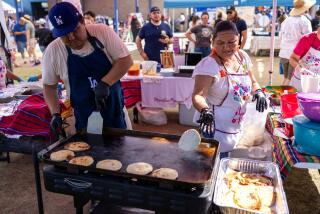L.A.’s Croats Celebrate Balkan Gains : War: In San Pedro, eyes are fixed on Croatian TV for the best news in four years. But some local Serbs say Croat atrocities have gone unreported as tide of fighting turns.
- Share via
As the satellite broadcast begins from Zagreb, the boisterous hum of celebrating Croatians comes suddenly to a dead halt. At the Croatian American Club in San Pedro--where the sign over the door reads, “What have you done for Croatia today?”--two dozen faces turn in unison toward the television set.
For the next hour, none will look away. The anchorwoman, speaking their native tongue, is delivering virtually the first good news from home since war broke out in the former Yugoslavia. Four years after Serb soldiers marched into their tiny republic, she says, the sons and cousins of these Croatian immigrants have run most of them back out.
About 30,000 Croats live in or near this rollicking port community of 75,000, making it one of the largest Croatian enclaves in the United States. And in recent days, the celebrating and unfurling of national flags has halted for only two reasons: to mourn friends killed in the fighting and to learn the latest news.
Said one man, before the broadcast began: “This has been the happiest hour of our lives--for the whole last week.”
Not so for many Serbs, who are scattered about Southern California in less concentrated pockets. They have strongly disputed the sentiment in the international community that they have been the prime aggressors in the four-year conflict. And the Rev. Deacon Blasko Paraklis of the Alhambra-based Serbian Orthodox Diocese of Western America, like many other Serbs, contended that alleged atrocities by Croats have gone unreported.
“Unfortunately, our allies--Americans--they had a selective form of morality from the very beginning of this war,” Paraklis said. “All the condemnations and restrictions have been against Serbia.”
Many local Serbs declined this week to speak publicly about the war, especially in light of the recent routing of Serb rebels.
A spokeswoman at St. Steven’s Serbian Orthodox Cathedral in Alhambra, a center of the Serb community in the Los Angeles area, said, “The church has no comment. The media never prints what we say.”
Like the Serbs, the Croats have also complained about American support. They argue that the United States failed to stop “Serb aggression” for four years. And the Croats at the San Pedro club lambasted the news media, one saying the coverage had been “Serb, Serb, Serb” since Croatia was first overrun.
But this day, full of pride and contending that their soldiers are poised to retake the entire country, the Croats were eager to speak--but only before and after the newscast.
“This time we shoot right in the heart,” said Zdenko Nilin. “We’ve been waiting for this.”
The majority of those gathered fled their homes decades before the war. Under cover of darkness they slipped across the border into Italy, or through Hungary to Austria and out of the grasp of the late Yugoslav leader Josip Broz Tito. Many came to San Pedro for the fishing, though the tuna have since dwindled. Others came for the Pacific Ocean, whose breezes remind them of those from the Adriatic Sea that cooled them in their youth. Almost all came because this is America.
“We are Americans,” Dragi Odak said. “We are Croatian Americans.”
“We are not Yugoslavs,” added another man, echoing a now-common phrase that was unspeakable in Yugoslavia when that country still existed.
The anchorwoman’s bespectacled face disappeared from the TV screen, replaced by images of burned-out cars, bombed-out homes, a tractor crushed by a tank. Another tractor appeared, this one driven by a Serbian woman, stuck in the middle of a miles-long convoy of refugees.
Croatian soldiers spoke to her, and they shared a half-laugh. Other soldiers handed sodas and food to children piled in the backs of farm trucks.
This is Croatian news, however, and just as Serbian broadcasts have downplayed reports of mass graves filled with Croatian soldiers, according to some observers, there is no mention of Serb convoys being stoned or shot up by Croats. Many of the 700-odd members of the Croatian American Club have visited Croatia since the war began, most shuttling tons of relief supplies into towns such as Split and Velaluka, where they were born. But most return home, where a satellite dish and short-wave radio are needed to monitor news broadcasts from Croatia.
On the wall above the crying baby is a phone number for a Croatian news hot line. Club members had called it occasionally before the Croatian offense last week, almost incessantly since.
“I call it at 3 o’clock in the morning, 4 o’clock,” said Nilin. “We follow this very, very closely--every day, every hour.”
When the broadcast is finished, some rush off, headed back to work or family. But others stay, speaking in Croatian about the day’s events and about a colleague whose death they learned about the day before. They will meet later to remember him.
Josko (Hari) Erak, 32, came to San Pedro in 1985 and financed his American dream through that quintessentially California business, film production.
When the war began, though, he returned to Croatia.
After being awake for three days fighting the battle for Knin, the rebel Serbs’ capital, he died this week in a late-night car crash while returning to his unit.
“It was important for him to go back and protect his country,” said friend John Z. Blazevich. “He gave up everything.”
More to Read
Sign up for Essential California
The most important California stories and recommendations in your inbox every morning.
You may occasionally receive promotional content from the Los Angeles Times.










